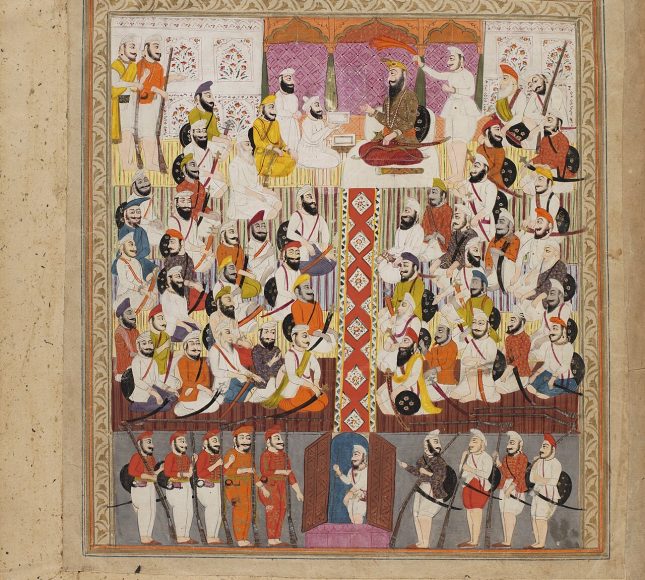SUKHDEV, a Kanyakubja Brahman from Uttar Pradesh, was one of the scholars and poets attached to Guru Gobind Singh. According to his own evidence, he was born at Kapilnagar and educated at Varanasi. He had been at the courts of several chieftains and officials, Hindu and Muslim, before joining Guru Gobind Singh at Paonta in 1687. He presented his Chhand Vichar Pingal, a treatise on prosody, to the Guru who rewarded him handsomely for it.
He completed Adhyatam Prakash, a work on Vedanta philosophy, much read and revered by Nirmala scholars to this day, on Assu sudi 11, 1755 Bk/6 September 1698 according to its colophon..A manuscript of Adhyatam Prakash is preserved in the Central Public Library at Patiala, and that of Chhand Vichar Pingal in the Khalsa College Library at Amritsar. Sukhdev`s three other extant works are panegyrics on three of his former patrons.
References :
1. Bhalla, Sarup Das, Mahima Prakash. Patiala, 1971
2. SukhaSingh, Gurbilas Dasvin Patshahi. Lahore, 1912
3. Padam, Piara Singh, Sri Guru Gobind Singh Ji de Durban Ratan. Patiala, 1976
4. Vidiarthi, Devinder Singh, Sri Guru Gobind Singh Abhinandan. Amritsar, 1983
Sukhdev stands as a luminous figure in the intellectual tapestry of Guru Gobind Singh’s court—a scholar whose works bridged classical literary traditions with the emerging Sikh ethos. Below is a deep dive into his life, contributions, and lasting impact:
Biographical Sketch
Sukhdev, a Kanyakubja Brahman hailing from Uttar Pradesh, was born at Kapilnagar and received his classical education in the revered city of Varanasi. Prior to settling at Guru Gobind Singh’s court in Paonta Sahib in 1687, he had already traversed various courts—both Hindu and Muslim—where he honed his craft as a scholar and poet. His cosmopolitan exposure allowed him to develop a unique literary voice, one that was welladapted to the rich, interfaith environment of Guru Gobind Singh’s entourage .
Literary Contributions
Chhand Vichar Pingal
Sukhdev’s treatise on prosody, Chhand Vichar Pingal, is an enduring testament to his mastery over meter and poetic form. In an era when the art of verse was not only a medium of aesthetic expression but also a vehicle for conveying profound ethical and spiritual truths, this work resonated deeply at the court. Guru Gobind Singh, recognizing the merit of his scholarship, rewarded him generously for this contribution—a reflection of the high esteem in which literary expertise was held .
Adhyatam Prakash
Sukhdev further enriched the intellectual milieu with Adhyatam Prakash, a treatise on Vedanta philosophy completed on 6 September 1698. This work proved influential, especially among Nirmala scholars, acting as an important lens through which Vedantic ideals were interpreted and dialogued within a Sikh context. The manuscript is treasured in institutions such as the Central Public Library at Patiala, underscoring its historical and scholarly significance .
Other Works and Panegyrics
Beyond his technical and philosophical treatises, Sukhdev also composed panegyrics celebrating his former patrons. These works not only underscore the close relationships between poets and their benefactors at the court but also mirror the cultural synthesis that Guru Gobind Singh actively cultivated. His writings contributed to a larger movement, ensuring that classical texts in Sanskrit, Hindi, and Persian were rendered into the Gurmukhi script—making them accessible to the emerging Sikh community.
Cultural and Historical Impact
The presence of scholars like Sukhdev at Guru Gobind Singh’s court was instrumental in fostering an environment where martial valor and intellectual pursuit were equally celebrated. His work is a part of the broader narrative of the 52 court poets—a constellation of intellectuals whose contributions laid the foundations for Sikh literary traditions. Through his engagement with Vedanta and poetic artistry, Sukhdev helped engender a cultural dialogue that bridged disparate traditions, affirming that spiritual inquiry and literary brilliance were not mutually exclusive but mutually reinforcing.
Furthermore, his contributions exemplify how Guru Gobind Singh’s court was much more than a martial hub; it was a vibrant center of learning where scholars, poets, and artists converged to craft a resilient, culturally rich community identity. Sukhdev’s legacy continues to be studied not only for its scholarly value but also as a window into the dynamic interplay between religious orthodoxy and progressive literary innovation in a period of profound transformation .



